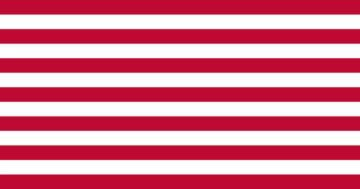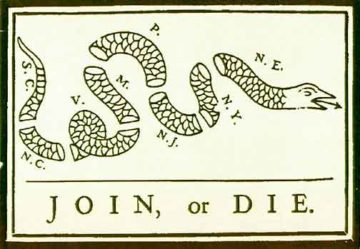Definition of Patriots: American Revolution
The beginnings of the Patriot movement in the American colonies did not happen overnight; it resulted from decades of economic and political issues with England and an influence of Enlightenment ideas such as republicanism.
Patriots: The American colonists who openly rebelled and fought the political and economic authority of the British Government. Also known as Whigs, revolutionaries, colonials, continentals, and Yankees.
Loyalists: The American colonists who remained loyal to the British government. Most were wealthy merchants and aristocrats who had financially solid connections with England and relied on the trade and policies of England to maintain their wealth. Also known as Royalists, Tories, and King’s Men.
Patriots American Revolution: Facts
The Patriots based their notions of rebellion on the Enlightenment philosophy of republicanism, the idea that government should reject the institution of monarchy and central control and embrace individual liberty, natural rights, and sovereignty granted by the people.
 Fig. 1 - The Spirit of 1776, a painting that exemplified the defiant spirit of the American patriots
Fig. 1 - The Spirit of 1776, a painting that exemplified the defiant spirit of the American patriots
Most individuals who claimed to be Patriots were from Boston, a city at the heart of the independence movement since the Stamp Act in 1765. Boston became the epicenter of rebellion as many of the taxation, enforcement, and governmental policies passed by England from the 1750s to 1770s directly impacted Bostonians.
Most Bostonians who identified as Patriots were also members of revolutionary groups such as the Sons of Liberty.
Soon, the Patriot movement spread to cities such as Baltimore and Philadelphia and in pockets of resistance in New York City. Many different Americans of varying backgrounds gravitated toward the Patriot cause, most directly influenced by the passage of policies such as the Stamp Act, the Townshend Acts, the Tea Act, and the Intolerable Acts. They consisted of lawyers, merchants, plantation owners, farmers, slaves and freemen, and politicians.
Famous Patriots: American Revolution
Listed below are several, but not all, prominent Patriots of the American Revolution:
Famous Patriots of the American Revolution |
Politicians, Statesmen, and Lawyers |
John Adams John Dickinson Benjamin Franklin Alexander Hamilton John Hancock John Jay Thomas Jefferson Richard Henry Lee James Madison |
Merchants and Writers |
Samuel Adams John Ames Patrick Henry Thomas Paine Paul Revere Roger Sherman Samuel Prescott |
Military Leaders |
Nathanael Greene George Washington Nathan Hale John Paul Jones Daniel Shays Charles Lee |
African American Patriots |
James Armistead Lafayette Crispus Attucks William Flora Saul Matthews Peter Salem |
The prominent political figures who were also patriots are colloquially called "the founding fathers" by many Americans.
Female Patriots: American Revolution
There were several famous and influential female Patriots during the American revolution.
Martha Washington: The wife of George Washington, but that is not what made her a patriot. Martha took up the patriot cause and took action. During the Continental Army’s difficult time at Valley Forge in 1777, Martha brought food and rations from the Washington Estate of Mt. Vernon and established sewing circles to repair uniforms.
Lucy Knox: Wife of General Henry Knox, Lucy disowned all of her Loyalist family when marrying Henry. Much like Martha Washington, during the harsh winter at Valley Forge, Lucy left her home to join her husband and help provide rations and clothing.
Abigail Adams: Wife of John Adams, and arguably one of the most influential patriots during the revolution for her arguments for independence in her letters to her husband and a strong advocate for equality in women's rights in creating the new government.
Mercy Otis Warren: An author and playwright who used her craft to promote her patriot views to the general public and helped bring people to the patriot cause.
Margaret Moore Barry: Volunteered to scout for the Continental Army during the Battle of Cowpens in South Carolina in 1781. Her scouting reports and ability to rally militia were vital in securing an American victory in the battle.
Esther DeBerdt Reed: Established an organization in Philadelphia during the war that collected monetary donations to support the Continental Army.
Margaret Cochran Corbin: The wife of an American military officer, Margaret is famous for her actions during the British attack on Fort Washington. As her husband John oversaw the artillery shelling the British advance, a gunner was killed. John stepped in to cover the position, but he, too, was killed. Margaret then stepped in and continued to fire the cannon alone until she was wounded and could not continue, losing the function of her left arm for the rest of her life.
Loyalists of the American Revolution
Loyalists were often older and had more established wealth in the colonies. Many felt a strong allegiance to the British Crown and saw the Patriot movement as treason. Most had solid financial connections in England or familiar connections with members of Parliament.
Several Famous Loyalists include:
William Franklin
Thomas Hutchinson
Thomas Brown
Joseph Brant
Andrew Allen
Isaac Low
John Zubly
 Fig. 2 - Though not an Englishmen, one of the most famous Loyalists was Joseph Brant, a Mohawk leader who sided with the British during the American Revolutionary War
Fig. 2 - Though not an Englishmen, one of the most famous Loyalists was Joseph Brant, a Mohawk leader who sided with the British during the American Revolutionary War
The issue of loyalists would be prevalent throughout the war as neither side, the patriots or the British, could fully trust the intentions of Loyalist Colonists. Many loyalists left the colonies with the outbreak of war. The confiscation of loyalist property became a debated issue during the Treaty of Paris of 1783.
Patriots of the American Revolution: Flag
There are several historical flags used by colonists who identified with the patriot cause:
 Fig. 3 -The Stamp Act Flag
Fig. 3 -The Stamp Act Flag
The Stamp Act Flag was used in 1765 as a symbol of community boycott and protest of the Stamp Act and was an early visual sign of the growing patriot movement.

Fig. 4- The "Rebellious Stripes"
The Stamp Act Flag was quickly adopted and modified into the "Rebellious Stripes" used by the Sons of Liberty in Boston.
This flag, consisting of thirteen red and white horizontal stripes, would also be adapted into the Flag of the United States.

Fig. 5- Albany Congress Cartoon
Though it began life as a cartoon printed in a newspaper in Philadelphia by Benjamin Franklin following the Albany congress, its notion and image were quickly adopted by the colonial Patriots and made into flags, pamphlets, and other images for display.
Patriots - Key takeaways
- Not every American colonist favored the independence movement. American Revolution Patriots were a minority group in the colonies, a loud group, but approximately a third of the colonist identified as Patriots even at the outbreak of war. Another third were Loyalists, holding fast to their status as British citizens and saw the movement for independence as treason.
- Patriots: The American colonists who openly rebelled and fought the political and economic authority of the British Government. Also known as Whigs, revolutionaries, colonials, continentals, and Yankees.
- The American colonists remained loyal to the British government. Most were wealthy merchants and aristocrats who had financially solid connections with England and relied on the trade and policies of England to maintain their wealth. Also known as Royalists, Tories, and King’s Men.
- The Patriots based their notions of rebellion on the Enlightenment philosophy of republicanism, the idea that government should reject the institution of monarchy and central control and embrace individual liberty, natural rights, and sovereignty granted by the people.
- There were several famous and influential female Patriots during the American revolution, as well as African Americans.
- Loyalists were often older and had more established wealth in the colonies. Many felt a strong allegiance to the British Crown and saw the Patriot movement as treason. Most had solid financial connections in England or familiar connections with members of Parliament.












